Power abuse in academia – problem description and suggestions for solutions

Jana Lasser | jana.lasser@tugraz.at | @janalasser
Who am I (and why am I talking about power abuse)?
2008 - 2015: study of physics in Göttingen.
2015 - 2018: PhD at the MPI for Dynamics and Self-Organisation.
During my PhD: PhD representative, 2018 spokesperson of the Max Planck PhDnet.
Currently: interim professor for Computational Social Science and Humanities at RWTH Aachen.
Board member of the Network Against Abuse of Power in Science (MaWi).
Cases of power abuse in the Max Planck Society

Two high-profile cases (Garching & Leipzig) in 2018, a lot of media attention.
Many conversations with PhD representatives and victims of power abuse.
We see patterns and systematic problems, leading to the foundation of the Network Against Abuse of Power in Science.
See white paper "Power Abuse and Conflict Resolution", May 2019.
What I am going to talk about today
- Power differentials and power abuse as systematic problems in academia.
- Serious consequences: mental health and increasing unwillingness of early career researchers to stay in academia.
- Suggestions for solutions: what can we do to prevent and deal with power abuse?
Power abuse "in the wild"
The following cases have been described to me by the victims. Details have been changed to ensure the anonymity of the affected people.
Case I: Extortion of labour
| Situation | Large, time-critical project, the PI is under pressure, the PostDoc gets pregnant, preliminary results do not support the primary hypothesis. |
| Conflict of interests | PostDoc wants to go on maternal leave, the PI wants "positive" results. |
| Consequence | The PI applies emotional pressure, demanding overtime work before the maternity leave and a short leave duration. The PI asks the PostDoc to "not deliver negative results". |
| Help? | The Equal Opportunities officer is not informed because the PostDoc fears retaliation by the PI. |
| Outcome | Mental health issues, research integrity is threatened. |
Case II: Neglect
| Situation | International doctoral researcher with a short initial contract. PI and lab assistant are a married couple. |
| Conflict of Interests | The doctoral researcher wants to take vacation to visit their family abroad. The PI wants the work to be done quickly. |
| Consequence | No support by the lab assistant. Lack of support and materials lead to bad results. Because of the bad results, the contract is not extended. |
| Help? | The works council or ombudsperson are not contacted – the doctoral researcher does not know that they exist. |
| Outcome | The PhD project is aborted. |
Case III: Extortion of labour
| Situation | After 4 years, the doctoral researcher has enough publications for a cumulative thesis according to the rules of the university. |
| Conflict of interests | The doctoral researcher wants to finish their PhD. The PI wants another publication and prevents the PhD from finishing. |
| Consequence | The degree is delayed, the working contract expires. The doctoral researcher keeps working on unemployment money. The PI declines to write a letter of recommendation. |
| Help? | The ombudsperson is contacted but does not intervene because they do not feel responsible for the situation. |
| Outcome | The doctoral reseacher receives their degree but their academic career is over. |
Case IV: bad scientific practice
| Situation | Famous PI, many doctoral researchers, risky projects, short contract durations. International doctoral researcher with a young family. |
| Conflict of interests | Contract extensions are tied to positive results. The doctoral researcher's visa is tied to the contract. |
| Consequence | The doctoral researcher works 70+ hours / week and doesn't take any vacation. |
| Help? | The ombudsperson is not contacted because they themselves are dependent on the PI and the doctoral researcher does not trust them. |
| Outcome | Sloppy science, immense psychological pressure. |
Abuse of power: a definition
Having and using power in itself is not morally reprehensible and sometimes necessary to effectively lead an organisation.
When power is used, interests have to be weighted against each other: what are the consequences for the person using power and for other persons affected?
Abuse of power: the more the person using the power is acting for their own benefit while damaging other people in an illegitimate way.
Such unethical behaviour can be legal an in the interest of (academic) organisations – especially as long as it is not discovered.
Singular cases?
Harassment: regular behaviour that creates an intimidating, hostile, socially isolating, discriminating or offensive working environment
(translated from Kolodej & Smutny 2020).
Kolodej & Smutny, Wann spricht man von Mobbing?, 2020.
Source: Verstöße gegen die wissenschaftliche Integrität in der Deutschen akademischen Psychologie, report of a survey by the ombuds committe of the DGPs, 2020
Singular cases?
Source: Verstöße gegen die wissenschaftliche Integrität in der Deutschen akademischen Psychologie, report of a survey by the ombuds committe of the DGPs, 2020
Harassment of doctoral researchers in the MPS
"While working at your institute, have you ever been subjected to harassment by a superior?"
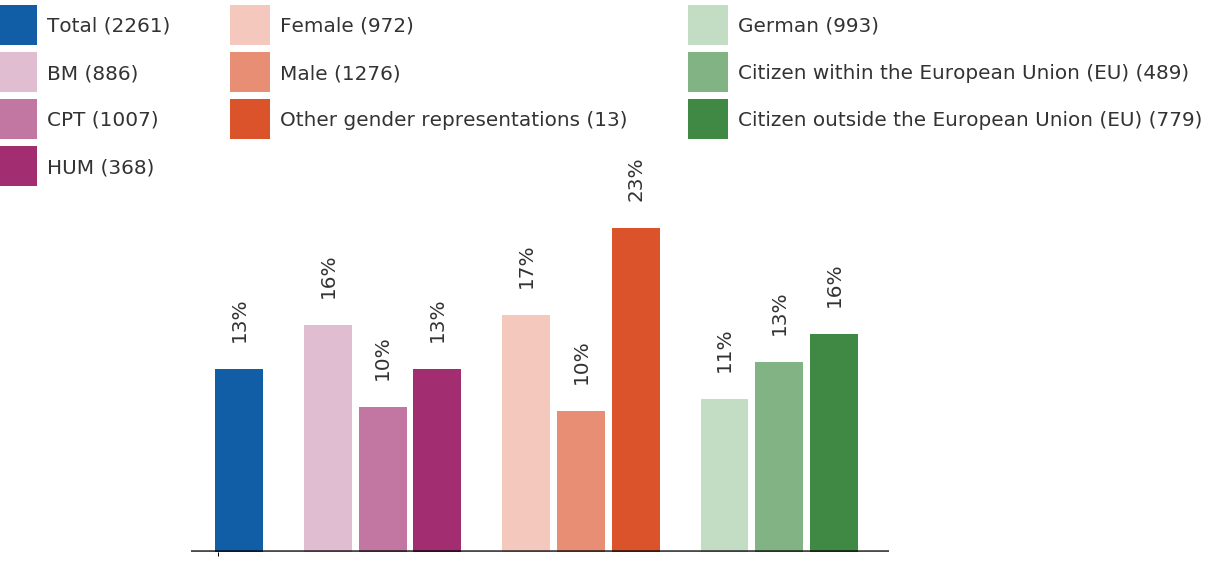
Source: Oolsthorn et al. 2020, "Max Planck PhDnet survey report". See also Schraudner et al. 2019 "Arbeitskultur und Arbeitsatmosphäre in der MPG".
Harassment and discrimination of PostDocs
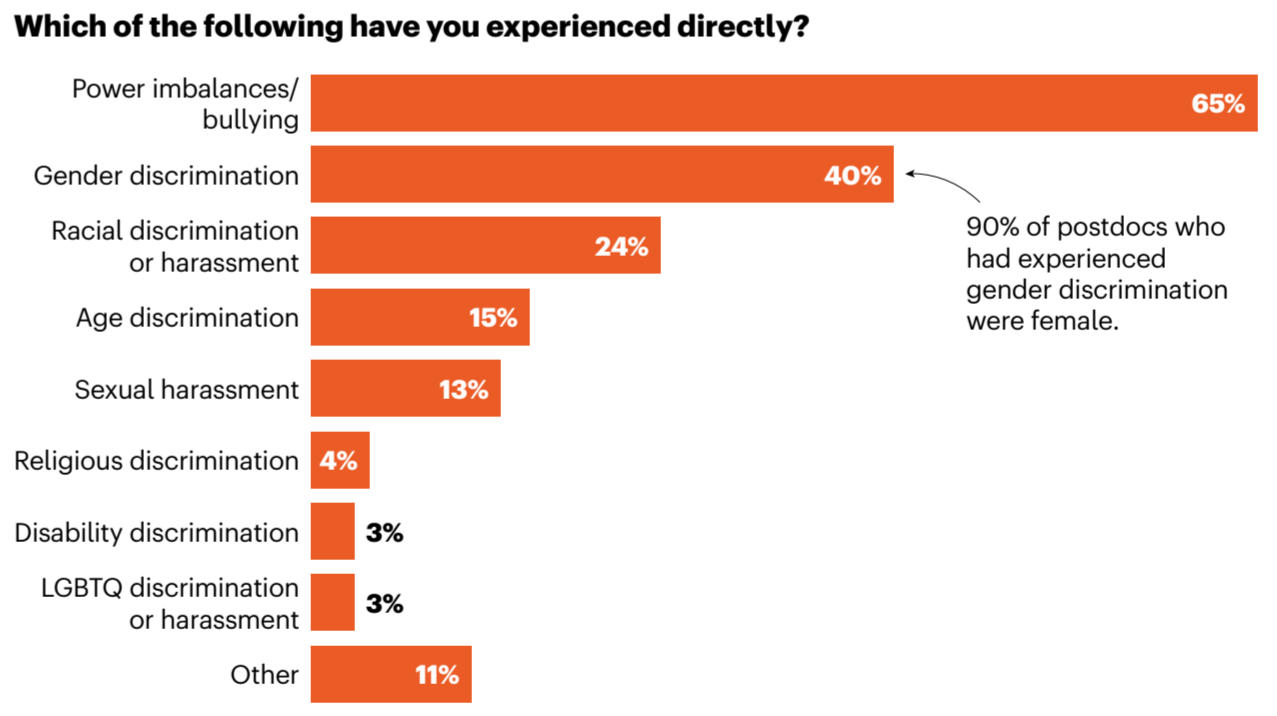
Source: Chris Woolston 2020, "Postdocs under pressure: ‘Can I even do this any more?’", Nature careers.
Bad scientific practice in the MPS
Were you ever involved in or observed ...
Bad scientific practice in psychology
Reports of bad scientific practice experienced or observed at work.
Source: Verstöße gegen die wissenschaftliche Integrität in der Deutschen akademischen Psychologie, report of a survey by the ombuds committe of the DGPs, 2020
Power differentials in German academia
Contract Oftentimes PIs singlehandedly decide about contract durations and extensions. For people from non-EU countries, visa depend on the working contract.
Assessment in Germany and oftentimes also Austria, PIs are responsible both for supervision as well as for the assessment of the PhD project.
Reputation Reputation is the foundation of an academic career. Reputation is codified in the letter of recommendation by the PI.
Institutional knowledge The fluctuation of non-tenured researchers is high due to the systematically intended high mobility. As a result, they often know less about their institution and their rights than their supervisors.
See Lasser et al. 2021 "Power abuse and anonymous accusations in academia – Perspectives from early career researchers and recommendations for improvement" in Beiträge zur Hochschulforschung.
Favourable conditions for power abuse
Many people experience academia as not only enabling unethical behaiour but actively encouraging and incentivising it (Chapman et al. 2019).
The discovery of abusive behaviour is very unlikely because of missing compliance mechanisms, conflicts of interest, and victims that are too afraid to report.
The punishment of abusive behaviour is even more unlikely due to missing incentives for institutions to pursue perpetrators.
Possible consequence: all people in the system on average show more unethical behaviour than they would under different circumstances.
Chapman et al. 2019 "Games academics play and their conse-quences: how authorship, h-index and journal impact factors are shaping the future of academia" in Proceedings. Biological Sciences.
How often are superiors the perpretators?
Source: Verstöße gegen die wissenschaftliche Integrität in der Deutschen akademischen Psychologie, report of a survey by the ombuds committe of the DGPs, 2020
Academic leaders
Integrity is a stable trait that varies across people (Moshagen et al., 2018).
The willingness to exploit and cheat others can be advantageous for an academic career especially if accompanied by high intelligence (Babiak & Haare 2006).
Academic leaders are still almost exclusively selected based on "excellence" in research.
People that are pre-disposed towards abusing their power are drawn to academia and are more likely to make it to powerful positions (Foster & Lund 2018, Täubner & Mahmoudi 2022).
Moshagen et al., 2018 "The dark core of personality", in Psychological Review.
Babiak & Hare, 2006 "Snakes in Suits: when Psychopaths go to work".
Foster & Lund, 2018 "Identifying and dealing with functional psychopathic behavior in higher education", in Global Business and Organizational Excellence.
Täubner & Mahmoudy, 2022 "How bullying becomes a career tool", in Nature Human Behaviour.
Summary
Power abuse in academia is rampant and not limited to singular cases: 15 – 25% of academics are affected by harassment at work, 20% are affected by bad scientific practice.
The academic system systematically fosters abuse of power.
Mechanisms that select academic leadership personnell favour people that are pre-disposed to abuse their power.
Mental health of doctoral researchers at the MPS
The prevalence of anxiety (17%) and depression (24%) among doctoral researchers is about twice as high as in a comparable non-academic cohort (Satinsky et al. 2021).
Satinsky et al. 2021, "Systematic review and meta-analysis of depression, anxiety, and suicidal ideation among Ph.D. students", in Scientific Reports
Mental health and supervision satisfaction
Max Planck PhDnet survey report 2019
Anxiety and harassment
Anxiety and harassment
Many factors correlate with mental health
Mental health is a reason to leave academia
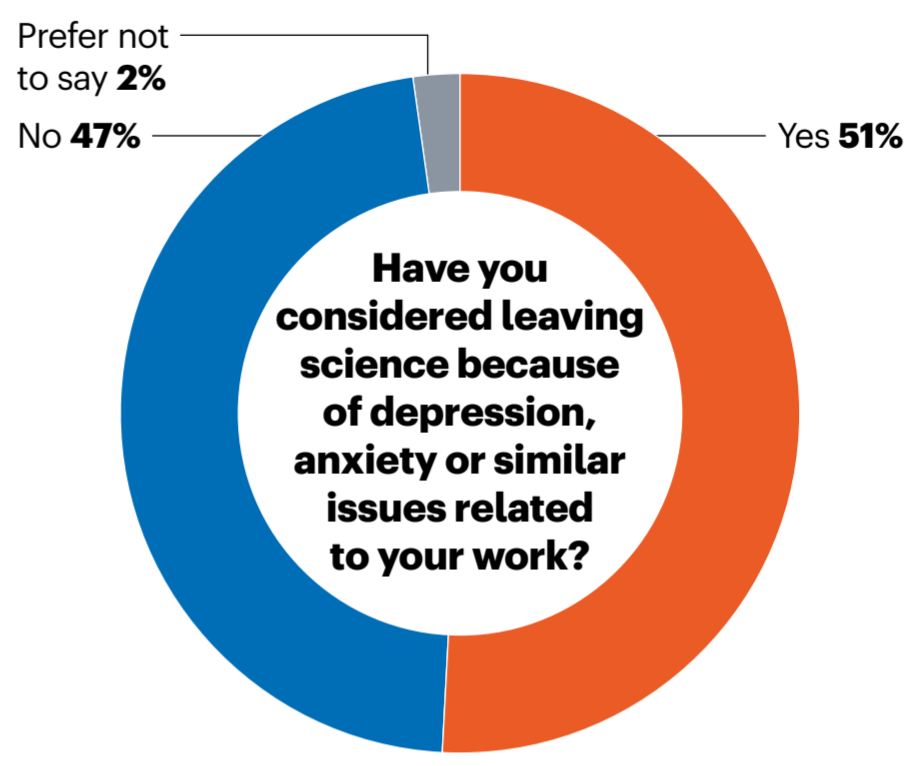
Source: Chris Woolston 2020, "Postdocs under pressure: ‘Can I even do this any more?’", Nature careers.
Where have all the PostDocs gone?
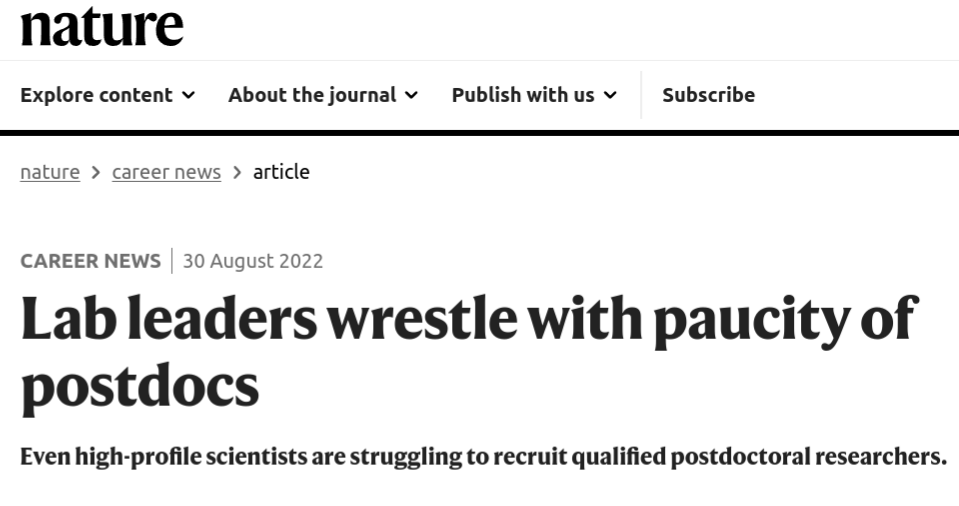
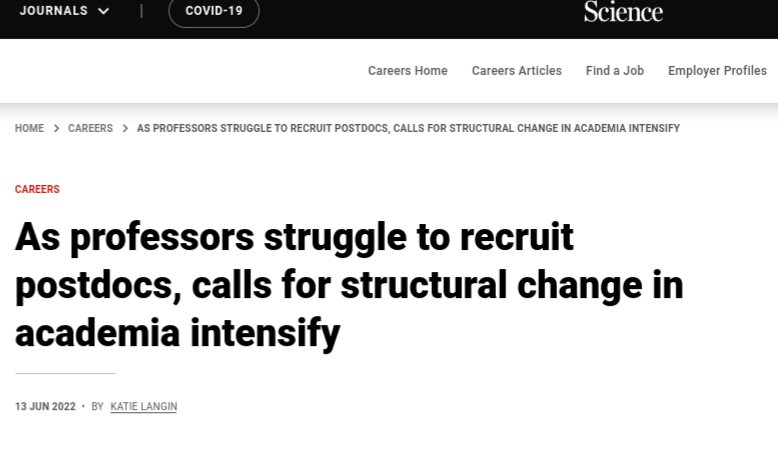
Summary
Mental health issues are rampant among academics.
There are many indicators that the (bad) relationship between supervisors and early career researchers plays an important role for mental health issues.
The working conditions in academia increasingly cause people to consider leaving academia.
How well do existing mechanisms to resolve conflicts work?
Is misconduct reported?
Have you reported misconduct that you experienced or witnessed?
Source: Verstöße gegen die wissenschaftliche Integrität in der Deutschen akademischen Psychologie, report of a survey by the ombuds committe of the DGPs, 2020
How do institutions act?
Did you feel supported by the institution to which you reported the misconduct?
Source: Verstöße gegen die wissenschaftliche Integrität in der Deutschen akademischen Psychologie, report of a survey by the ombuds committe of the DGPs, 2020
What happens after the report?
Are you satisfied with the results of the report?
Source: Verstöße gegen die wissenschaftliche Integrität in der Deutschen akademischen Psychologie, report of a survey by the ombuds committe of the DGPs, 2020
The Ombud-System of the Max Planck Society
Are you aware of the rules on good scientific practice by the Max Planck Society?
Is there a neutral person to turn to in case you observe severe misconduct (ombudsperson)?
What happens if misconduct is reported?
What happens if misconduct is reported?
Summary
Very few cases are reported: only 20 – 25% of experienced or witnessed harassment and 10 – 15% of scientific misconduct are reported.
There is a significant chance of facing negative consequences for the reporting person (1 out of 10). People reporting misconduct experience the institutional support as lacking.
The Satisfaction with the outcome of reports is very low: only 10 – 20% are "mostly" or "completely" satisfied with the outcome.
Sources: Verstöße gegen die wissenschaftliche Integrität in der Deutschen akademischen Psychologie, Max Planck PhDnet survey report 2019.
What can we do?
Raising awareness
Unethical behaviour is not necessarily illegal – the law is not sufficient to prevent it.
Institutions should make their values and wanted/unwanted behaviours explicit – analogous to the rules of good scientific practice.
Values and behaviours should be anchored in the institution's working culture via regular and mandatory workshops in which case studies are discussed.
Taboos should be broken: sexualised violence, antisocial leadership behaviour, conflicts of interests and misaligned incentives need to be discussed more openly.
Reducing power differentials
If power differentials are reduced, there are less opportunities to abuse them.
Power in itself is not problematic, only its concentration in a single person is.
Supervision and assessment of dissertation projects should be separated.
Doctoral researchers should be supervised by thesis committees including people independent of the primary supervisor.
The duration of working contracts should equal the average duration of a PhD. Positions after the PhD should be tenured as the rule rather than the exception.
Supporting victims
Victims of power abuse are currently mostly left to fend for themselves.
In the case of abuse of power, institutional emergency mechanisms need to be specified and widely communicated.
Mechanisms need to be established to change supervisor and secure funding until completion of the PhD.
Access to data and devices required to complete the PhD as well as authorship of publications in which the doctoral researcher worked need to be secured.
Access to independent and free counselling and legal advice needs to be ensured.
Creating transparency
Transparent work processes make misconduct less likely.
Adherence to Open Science practices (publication of data, code and protocolls) and specification of contribution of all authors in publications (CRediT).
Create transparency about assessment processes (who assesses whom and in which context) to reduce nepotism.
Steps in reporting processes need to be communicated transparently and timely towards affected people.
Other research institutions should be informed about the results of investigations to avoid "pass the harasser", see also a current case at the University of Uppsala).
Strenghtening independent control
There is currently almost no external control of ethical conduct at research institutions.
Independent external bodies for conflict resoltion and control need to be established since conflicting interests in institutions are frequent and internal bodies are not trusted.
The German Research Ombudsman of the DFG is helpful but overloaded.
The responsible authorities need to be strengthened with sufficient resources and competencies to ensure professional treatment of cases and the ability to impose consequences.
Demanding good leadership
As long as there are incentives for unethical leadership behaviour, it will ocurr.
Assessment criteria beyond the scientific output need to be established in recruitment and promotion processes.
A robust feedback culture (e.g., 360° feedback) needs to be established.
Establishing exit-interviews with people that leave an institution.
In case of bad leadership: impose serious consequences.
Measures for self-help: securing the evidence
Timely, detailed, written documentation of experiences (date, place, involved people). Potentially ask a trusted person to act as witness.
Save digital documents (emails, labnotes, text messages) at a secure place outside the influence of the employer.
Ask witnesses to join and document important meetings.
Measures for self-help: know your rights
Make sure you know your rights: employment law, undue advantage (Vorteilsnahme), sexual self-determination, whistleblower protection, copyright, general equal treatment law (allgemeines Gleichbehandlungsgesetz).
Representatives like PhD and PostDoc representations and unions can help.
Network with other affected people, exchange experiences and potentially act together.
Measures for self-help: act strategically
Avoid delicate communication (especially via email) over institutional channels.
Avoid emotionally charged communication or threats towards the perpetrator ("keep the moral high-ground").
Reflect your dependencies and develop a strategy to deal with them. Example: it might be safer to finish the degree first and then report misconduct.
Make agreements with the opposing party and/or institution only in writing and in the best case accompanied by legal cousel.
Measures for self-help: seek help
Ask your friends/family for support in difficult times and potentially seek professional counselling.
Ask for independent legal advice early. A union membership (GEW, Verdi) usually includes legal protection insurance.
Seek information about internal mechanisms (ombudsperson, Equal Opportunities officer, works council, mediation) and use them if trustworthy.
Use help that is independent from the institution such as the German Research Ombudsman or the Network Against the Abuse of Power in Science.
Questions?
Slides!